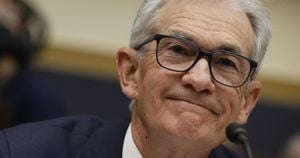Political machinery is heating up once again as allegations of corruption take center stage, especially with the Congress party making strong moves against the state government over the so-called "jobs-for-cash" scandal. The Congress has issued a firm ultimatum, threatening widespread protests across Goa if the government does not appoint a judicial commission to investigate this serious allegation, with accusations pointing at several high-profile politicians.
The leader of the Opposition, Yuri Alemao, has been vocal, condemning the government's response to the issue as akin to circus antics. His words were vivid: "This government is like a circus, with each minister acting independently as if they were the Chief Minister." Alemao's critique doesn’t just stop at colorful metaphors; he emphasizes the gravity of the situation, expressing disbelief at Chief Minister's silence on the party’s demands for a judicial inquiry.
Amit Patkar, president of the Goa Pradesh Congress Committee, echoed these sentiments, stating emphatically, "If the government fails to take action, we will not hesitate to take this issue to the streets," alluding to their preparedness for civic mobilization against the state authorities. Reminding the public, he suggested ordinary citizens and victims of the alleged scam should step forward to voice their grievances, vowing full support from the Congress party. Ramakant Khalap, another Congress leader, didn't pull any punches either, describing the corruption scandal as "a cancer, devouring people," calling for the involvement of specialized investigative teams, including possibly conducting narco tests for the implicated individuals.
But this isn't just limited to the Congress party's fight; they are joined by other political players as well. The Aam Aadmi Party is also adding pressure on the government by urging the governor to summon the Chief Minister over the alleged jobs-for-cash scam. This shows how widespread the calls for accountability have become, uniting various factions against the ruling government.
Meanwhile, the air is thick with political tension as Chief Minister M.K. Stalin’s government faces accusations from Edappadi K. Palaniswami, opposition leader for the AIADMK, who criticizes Stalin for allegedly neglecting the proposals from his government. Palaniswami claims the current administration is backtracking on various developmental projects initiated during his tenure and is now claiming the successes for themselves. "The MOU with Ola Electric was inked under my tenure, and Tata Electronics too was brought here through my efforts," Palaniswami stated confidently, as he participated at the inaugural of a wedding hall, making his presence known and his political stance clear.
With the political stakes increasingly raising, it’s interesting to note how these charges are being framed within the larger picture of state governance, where both sides hurl accusations over the management and accomplishment of industrial projects. Palaniswami questioned the commitment of the DMK to enact its promises, demanding transparency through the issuance of a white paper detailing their electoral promises, something he argues is being deliberately evaded.
On the ground, all of this political maneuvering translates to intensified calls for protests, as the citizens of Goa and Tamil Nadu watch closely to see the fallout. Local leaders are gearing up, mobilizing support, and the mood is pent up with both outrage and anticipation. The common thread among these political parties is the push for accountability and transparency, which remains painfully fractured as allegations swirl about potential misuse of power and resources.
The Congress party seems particularly poised to capitalize on public sentiment, as many citizens voice their concerns over corruption and mismanagement. The promised protests could signify more than just dissatisfaction — they may ignite renewed activism, reviving the once fervent engagement seen during previous political scandals.
It’s evident the demand for investigations isn’t merely administrative red tape; for many, it’s about reclaiming trust and integrity within their political system. With each passing day, the pressure mounts as leaders and their followers refuse to back down. They understand, perhaps only too well, the stakes involved: transparency could usher change, whereas silence could permit corruption to fester.
So, as the political stage is set, with threats of protests intertwined with demands for investigations, the spotlight is firmly cast upon the Goa government and its leaders. The outcome of this drama remains uncertain, but one thing is clear: the citizens are not willing to merely stand on the sidelines. This call for accountability could manifest as both rallies and dialogues about the future of governance and political integrity across India; the conversations sparked now may reverberate well beyond the borders of Goa and Tamil Nadu.



